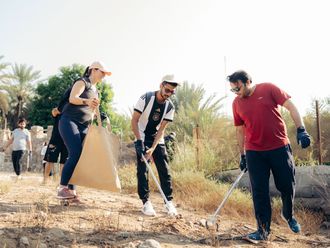Disabled people are not only the most deprived human beings in the developing world, they are also the most neglected. It is important to acknowledge that more than 600 million people in the world live with some form of disability.
More than 400 million of them live in developing countries, often amidst poverty, isolation and despair. Not only are they, typically, the poorest of the poor, but they also need more money and help than able-bodied people to overcome their handicaps, and attempt to live normal lives.
As if the many hardships are not painful enough, disabled people can face exclusion and discrimination at the hands of their fellow citizens, even their own families who fear they will be tarnished by association.
For example, many disabled children, whether deaf or in wheelchairs, are denied an education. Disabled people are at increased risk of contracting HIV/Aids due to physical and sexual abuse, and a lack of preventive outreach tailored specifically for disabled people.
And yet, experience shows that in countries where people with disabilities have greater access to their broader communities, they can flourish.
It is estimated that at least 10 per cent of the developing world's population is disabled in one way or another.
Global attention
In fact, some estimates put the figure closer to 20 per cent. Not only do these people deserve the right to global attention because of the extreme nature of their deprivation, but it is also important to recognise the impossibility of achieving large reductions in poverty and illiteracy in the world (as demanded by the United Nations' Millennium Development Goals, endorsed by more than 180 world leaders in September 2000), unless special efforts are made to bring disabled people into the mainstream.
Take the case of education. An estimated 40 million of the more than 100 million children out of school have disabilities. And yet most of our schools are built without access for children who have physical disabilities, and most teachers are not trained to deal with children who have handicaps of one kind or another, including learning disabilities.
However, with some basic social help, the terrible consequences of disability can be substantially overcome. It is also important to see that most disabilities are preventable. Only a small proportion of the 600 million people living with disabilities were born that way.
For example, malnutrition and lack of access to clean water can lead to blindness. Other disabilities can result from HIV/Aids, measles, polio, road crashes, injuries at work, discarded mines or unexploded ordnance.
While a rapidly aging population creates a growing source of disabling conditions, the incidence of disability can be significantly reduced through well-designed social and medical attention.
As we consider how best to respond to the needs of disabled people in poor countries, it is important to understand that simple and inexpensive solutions do exist in many cases.
For example, during renovation or restoration efforts in the wake of natural disasters or conflicts, it is possible to make sure that the newly built or repaired buildings are made accessible to people with disabilities; this can add very little to the costs involved.
Take another example: The movements of disabled and old people can often be restricted by high curbs that flank their streets, but, as a good many countries have already shown, these curb designs can be changed at little cost.
Also, many people are in a gray area with mild to moderate mental health disorders, intellectual disabilities or physical handicaps. Policies that can help them join the mainstream of society can certainly be devised.
A number of developing country governments are working with national disability groups to overcome restrictive barriers.
In Brazil, which is one of the first developing countries to improve its collection of disability data, surveys showed that large numbers of children with significant visual disabilities simply needed spectacles.
The World Bank has been closely involved in these efforts, both in terms of providing glasses, hearing aids and other interventions, but also in gathering better statistics on people's disabilities and their consequences.
Typically confined
In this latter respect, social scientists also have a responsibility to investigate the incidence of different handicaps and their remedies.
We have to be determined to bring disabled people out of the shadowy world in which they are typically confined.
This task demands more global cooperation, involving national and international institutions as well as organisations of disabled people themselves. The United Nations is working on a Convention on the Rights of Disabled People to help move disabled people from exclusion to inclusion.
Disabled people want what we all want the chance to get educated, find rewarding work, lead worthwhile lives and be valued members of their community and in the world at large.
These desires need not be just idle dreams, since much can be achieved if we are ready to give this extensive problem the attention and commitment it demands. We need to mobilise the determination to do just exactly that.
Amartya Sen is Lamont University Professor at Harvard University, recipient of the 1998 Nobel Prize in Economic Science and former honorary president of Oxfam.
James D. Wolfensohn is president of the World Bank Group and a former board chairman of the International Federation of Multiple Sclerosis Societies.
© Global Viewpoint. Distributed by Tribune Media Services Inc.The International Day of Disabled Persons is Friday, December 3












